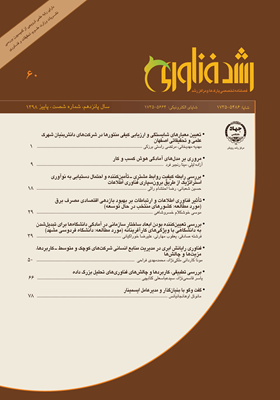تأثیر فناوری اطلاعات و ارتباطات بر بهبود بازدهی اقتصادی مصرف برق (مورد مطالعه: کشورهای منتخب در حال توسعه)
محورهای موضوعی : مديريت دانش
1 - دانشگاه علامه طباطبائی
کلید واژه: فناوری اطلاعات ارتباطات مصرف برق کشورهای در حال توسعه مدلسازی,
چکیده مقاله :
وجود پیشرفتهای مختلف در عرصه فناوری اطلاعات و ارتباطات (فاوا) و بکارگیری این پیشرفتها توسط جوامع بشری، دارای آثار دوگانهای بر مصرف یکی از مهمترین حاملهای انرژی یعنی انرژی الکتریسیته است. بكارگيري فناوری اطلاعات و ارتباطات از يكسو باعث جانشيننمودن فناوریهاي جديد با فناوریهاي قديمي شده و لذا منجر به بهبود بهرهوري و كارايي مصرف انرژی الکتریسیته و در نتيجه كاهش مصرف آن ميشود (اثر جانشيني) از سوي ديگر نصب، راهاندازي و بهرهبرداري از تجهيزات جديد فناوری اطلاعات و ارتباطات باعث افزايش تقاضا براي مصرف انرژی الکتریسیته ميشود (اثر درآمدي). بنابراين اثر كلي فناوری اطلاعات و ارتباطات بر مصرف انرژی الکتریسیته تابعي از قدرت نسبي يكي از اثرات جانشيني و درآمدي است. بر همین اساس در مقاله حاضر، رابطه بین بکارگیری فناوری اطلاعات و ارتباطات و مصرف انرژی الکتریسیته در 15 کشور منتخب در حال توسعه طی دوره زمانی 2015-1994 مورد بررسی قرار گرفت و برای این منظور از روششناسی مبتنی بر الگوی پانل پویا با رویکرد PMG استفاده گردید. دادههای مربوط به مصرف برق، رشد اقتصادی، تعداد استفادهکنندگان از اینترنت و تعداد مشترکین تلفنهمراه نیز از پایگاههای آماری WDI و دادههاي سازمان ملل اقتباس شدند. نتایج تحقیق در قالب دو مدل جداگانه نشان میدهند که افزایش بکارگیری فناوری اطلاعات و ارتباطات باعث میشود تا مصرف سرانه انرژی الکتریسیته هم در کوتاهمدت و هم در بلندمدت در کشورهای منتخب در حال توسعه افزایش یابد. همچنین نتایج نشان میدهند که در كشورهاي منتخب در حال توسعه، رشد اقتصادي علت مصرف انرژی الکتریسیته بوده ضمن اینکه رابطه عليت يكطرفه از فناوری اطلاعات و ارتباطات به مصرف برق و رشد اقتصادي وجود دارد.
The advent of information and communication technology (ICT) and the use of these advances by human societies has duality effects on electrical energy consumption. First, the use of information and communication technology has led to the replacement of new technologies with old technologies and thus improves the efficiency of electricity consumption and, consequently, reduces their consumption (substitution effect). Second, installation, commissioning and operation of new information and communication technology equipment will increase demand for electricity (income effect). Therefore, the overall effect of information and communication technology on electricity consumption is a function of one of the effects. Accordingly, in this paper, the relationship between the use of information and communication technology and electricity consumption in a group of selected developing countries during the period of 1994-2015 was studied. For this purpose, the dynamic panel model with the PMG approach was used. The results presented in two separate models show that increasing the use of information and communication technology will increase per capita consumption of electricity energy in both short and long term in selected developing countries. Also, the results show that in selected developing countries, economic growth is the cause of electricity consumption, while there is a one-way causality relationship between information and communication technology and electricity consumption and economic growth.
1- بهبودی، داوود، اصغرپور، حسین، قزوینیان، محمدحسین، "بررسی رابطه مصرف کل برق و رشد اقتصادی ایران (1385-1346)"، مطالعات اقتصاد انرژی، دوره 5، شماره 17، صص 72-57، 1387.
2- مهرآرا، محسن، فراهانی، راضیه، حسنزاده، آیت، "بررسی رابطه میان رشد مصرف برق و رشد اقتصادی در کشورهای منتخب صادرکننده نفت"، مدلسازی اقتصادی، شماره 14، صص 90-69، 1390.
3- حیدری، حسن، نجار، محمد، سعیدپور، لسیان، "بررسی رابطه بین برق، قیمت برق و رشد اقتصادی در ایران"، فصلنامه پژوهشها و سیاستهای اقتصادی، سال 19، شماره 59، صص 200-175، 1390.
4- قاسمي، عبدالرسول، محمدخان، رقيه، "بررسي تأثير فناوري اطلاعات و ارتباطات بر شدت مصرف انرژي در بخش حمل و نقل"، پژوهشنامه اقتصاد انرژي ايران، سال چهارم، شماره 13، صص 190-169، 1393.
5- كرامتي، گلخندان، خوانساري، مسعود، "تأثير فناوري اطلاعات و ارتباطات بر مصرف انرژي در ايران (رويكرد آزمون باند)"، فصلنامه تحقيقات توسعه اقتصادي، شماره شانزدهم، صص 126-103، 1393.
6- Moyer JD, Hughes BB., “ICTs: do they contribute to increased carbon emissions?“ Technol Forecast Soc Change, 79:919–31, 2012.
7- Shahiduzzaman M, Alam K., “Information technology and its changing roles to economic growth and productivity in Australia”. Telecommun Policy, 38:125–35, 2014.
8- The United Nations, “U.N. Report of the special rapporteur on the promotion and protection of the right to freedom of opinion of expressions”, 2001.
9- Greenpeace International, Clicking clean: how companies are creating the green Internet, 2014.
10- World Development Indicators (WDI), World Bank, 2017.
11- Salahuddin M, Alam K., “Internet usage, electricity consumption and economic growth in Australia: a time series evidence”. Telemat Inform, 32:862–78, 2015.
12- Cho, Y., Lee, J. and Kim, T., “The impact of ICT investment and energy price on industrial electricity demand: Dynamic growth model approach”, Energy Policy, Vol. 35, Issue 9, PP. 4730-4738, 2007.
13- IEA, Gadgets and gigabytes. Policies for energy efficient electronics, OECD/IEA, International Energy Agency, Paris, 2009.
14- Heddeghem VW, Lambert S, Lannoo B, Colle D, Pickavet M, Demeester P., Trends in worldwide ICT electricity consumption from 2007 to 2012. Comput Commun, 2014.
15- Kraft J, Kraft A., “On the relationship between energy and GNP”. J Energy Dev, 3:401–3, 1978.
16- Yoo S., “The causal relationship between electricity consumption and economic growth in ASEAN countries”. Energy Policy, 34:3573–82, 2006.
17- Narayan PK, Narayan S, Popp S., “Does electricity consumption panel Granger cause GDP? A new global evidence”. Appl Energy, 87:3294–8, 2010.
18- Sadorsky P., “Information communication technology and electricity consumption in emerging economies”. Energy Policy, 48:130–6, 2012.
19- Romm J., “The Internet and the new energy economy”. Resour Conserv Recycl, 36:197–210, 2002.
20- Takase K, Murota Y., “The impact of ICT investment on energy: Japan and US comparison in 2010”. Energy Policy, 32:1291–301, 2004.
21- Pesaran, M., Shin, Y. and Smith, R., “pooled Estimation of Long-Run Relationships in Dynamic Heterogeneous Panels”, Journal of the American Statistical Association, Vol. 94, No. 446, pp. 621-634, 1999.
22- Baltagi, B., “Econometric Analysis of Panel Data”, John Wiley & Sons Ltd., 2005.


